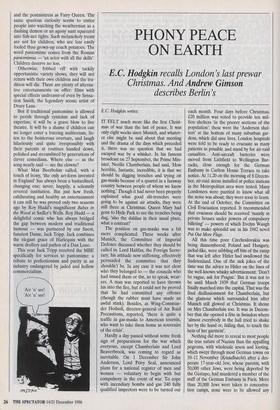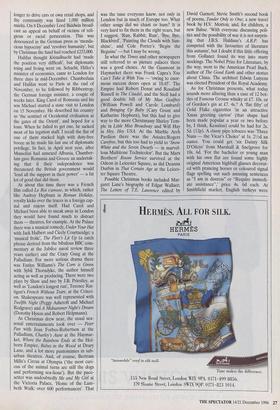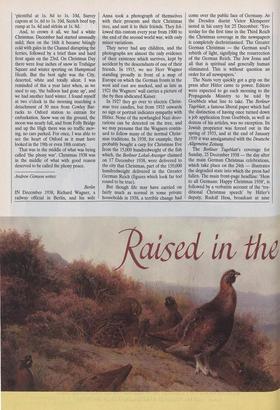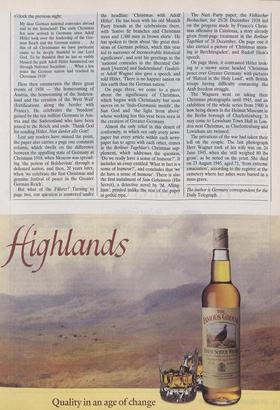PHONY PEACE ON EARTH
E.C. Hodgkin recalls London's last prewar Christmas. And Andrew Gimson describes Berlin's E. C. Hodgkin writes: IT FELT much more like the first Christ- mas of war than the last of peace. It was only eight weeks since Munich, and whatev- er else might be said about that meeting and the drama of the days which preceded it, there was no question that we had escaped war by a whisker. In his famous broadcast on 27 September, the Prime Min- ister, Neville Chamberlain, had said, 'How horrible, fantastic, incredible, it is that we should be digging trenches and trying oft gas-masks because of a quarrel in a faraway country between people of whom we know nothing.' Though it had never been properly explained what good slit-trenches were going to be against air attacks, they were still there at Christmas. Queen Mary had gone to Hyde Park to see the trenches being dug, 'also the dahlias in their usual place, what a contrast!'
The position on gas-masks was a bit more complicated. Three weeks after Munich, the Committee of Imperial Defence discussed whether they should be called in. Lord Halifax, the Foreign Secre- tary, his attitude now stiffening, effectively persuaded the committee that they shouldn't be. In any case it was not clear who they belonged to — the councils who had issued them or the, so to speak, wear- ers. A man was reported to have thrown his into the fire, but it could not be proved that he had committed any offence (though the rubber must have made an awful stink). Besides, as Wing-Comman- der Hodson, director-general of Air Raid Precautions, reported, 'there is quite a traffic in gas-masks to American tourists, who want to take them home as souvenirs of the crisis'.
Hardly a day passed without some fresh sign of preparations for the war which everyone, except Chamberlain and Lord Beaverbrook, was coming to regard as inevitable. On 1 December Sir John Anderson, Lord Privy Seal, announced plans for a national register of men and women — voluntary to begin with but compulsory in the event of war. To cope with incendiary bombs and gas 240 fully qualified inspectors were to be turned out each month. Four days before Christmas, £20 million was voted to provide ten mil- lion shelters 'in the poorer sections of the population'; these were the 'Anderson shel- ters' at the bottom of many suburban gar- dens, which did save lives. London hospitals were told to be ready to evacuate as many patients as possible and stand by for air-raid casualties. Anti-aircraft batteries were moved from Lichfield to Wellington Bar- racks, close enough for the German Embassy in Carlton House Terrace to take notice. At 11.20 on the morning of 8 Decem- ber, air-raid sirens installed at police stations in the Metropolitan area were tested. Many Londoners were puzzled to know what all the noise was about; they were soon to learn. At the end of October, the Committee on Civil Evacuation reported. It recommended that evacuees should be received 'mainly in private houses under powers of compulsory billeting' — powers of which Evelyn Waugh was to make splendid use in his 1942 novel Put Out More Flags.
All this time poor Czechoslovakia was being dismembered; Poland and Hungary, jackal-like, were nibbling off bits of the rump that was left after Hitler had swallowed the Sudetenland. One of the sick jokes of the time was the advice to Hitler on the lines of the well-known whisky advertisement: 'Don't be vague, ask for Prague.' But it was not to be until March 1939 that German troops finally marched into the capital. That was the final disillusionment for Chamberlain, but the glamour which surrounded him after Munich still glowed at Christmas. It shone on Mrs Chamberlain too. It was in Decem- ber that she opened a fête in Swindon where 'almost everybody in the hall tried to shake her by the hand or, failing that, to touch the hem of her garment'.
Nothing did more to reveal to most people the true nature of Nazism than the appalling pogroms, with wholesale arson and looting, which swept through most German towns on 10-11 November (Kristallnacht) after a des- perate 17-year-old Jew, whose parents, with 50,000 other Jews, were being deported by the Gestapo, had murdered a member of the staff of the German Embassy in Paris. More than 20,000 Jews were taken to concentra- tion camps, none were to be allowed any longer to drive cars or own retail shops, and the community was fined 1,000 million marks. On 8 December Lord Baldwin broad- cast an appeal on behalf of victims of reli- gious or racial persecution. This was denounced in the German press as 'menda- cious hypocrisy' and `revolver humanity', but by Christmas the fund had reached £233,000.
Halifax thought Kristallnacht had 'made the position very difficult', but diplomatic toing and froing went on. Schacht, Hitler's minister of economics, came to London for three days in mid-December. Chamberlain and Halifax went to Paris at the end of November, to be followed by Ribbentrop, the German foreign minister, a couple of weeks later. King Carol of Romania and his son Michael started a state visit to London on 15 November. He described his country as `the sentinel of Occidental civilisation at the gates of the Orient', and hoped for a loan. When he failed to get one, he sacked most of his legation staff. I recall the flat of one of them stacked high with duty-free booze as he made his last use of diplomatic privilege. In fact, in April next year, after Mussolini had annexed Albania, Chamber- lain gave Romania and Greece an undertak- ing that if their independence was threatened the British government would 'lend all the support in their power' — a fat lot of good that did them.
At about this time there was a French film called Le Roi s'amuse, in which, rather like Audrey Hepburn in Roman Holiday, royalty kicks over the traces in a foreign cap- ital and enjoys itself. Had Carol and Michael been able to sneak away in London they would have found much to distract them — theatres, for example. At the Palace there was a musical comedy, Under Your Hat with Jack Hulbert and Cicely Courtneidge; a 'musical frolic', The Fleet's Lit Up (a catch phrase derived from the bibulous BBC com- mentary at the Jubilee naval review three years earlier) and the Crazy Gang at the Palladium. For more serious drama there was Emlyn Williams's The Corn is Green with Sybil Thorndyke, the author himself acting as well as producing. There were two plays by Shaw and two by J.B. Priestley, as well as `London's longest run', Terence Rat- tigan's French Without Tears, at the Criteri- on. Shakespeare was well represented with Twelfth Night (Peggy Ashcroft and Michael Redgrave) and A Midsummer Night's Dream (Dorothy Hyson and Robert Helpmann).
As Christmas drew near, the usual sea- sonal entertainments took over — Peter Pan with Jean Forbes-Robertson at the Palladium, Charley's Aunt at the Haymar- ket, Where the Rainbow Ends at the Hol- born Empire, Babes in the Wood at Drury Lane, and a lot more pantomimes in sub- urban theatres. And, of course, Bertram Mills's Circus at Olympia ('the most curi- ous of the animal turns are still the dogs and performing sea-lions'). But the pace- setter was undoubtedly Me and My Girl at the Victoria Palace, 'Home of the Lam- beth Walk: over 600 performances'. That was the tune everyone knew, not only in London but in much of Europe too. What other songs did we chant or hum? it is very hard to fix them in the right years, but I suggest, 'Run, Rabbit, Run', 'Bye, Bye, Blackbird', 'Painting the Clouds with Sun- shine', and Cole Porter's 'Begin the Beguine' — but I may be wrong.
in what the Times and other newspapers still referred to as picture palaces there was a good choice. At the Gaumont in Haymarket there was Frank Capra's You Can't Take it With You — 'owing to enor- mous success doors open at 10.45'. The Empire had Robert Donat and Rosalind Russell in The Citadel, and the Stoll had a good double bill of My Man Godfrey (William Powell and Carole Lombard) and Bringing Up Baby (Cary Grant and Katharine Hepburn), but this had to give way to the more Christmassy Shirley Tem- ple in Little Miss Broadway and Will Hay in Hey, Hey USA. At the Marble Arch Pavilion there was the .Astaire/Rogers Carefree, but this too had to yield to 'Snow White and the Seven Dwarfs — in marvel- lous Multitone Technicolor'. But the Marx Brothers' Room Service survived at the Odeon in Leicester Square, as did Deanna Durbin in That Certain Age at the Leices- ter Square Theatre.
Possible Christmas books included Mar- garet Lane's biography of Edgar Wallace; The Letters of T.E. Lawrence edited by David Garnett; Stevie Smith's second book of poems, Tender Only to One; a new travel book by H.V. Morton; and, for children, a new Babar. 'With everyone discussing poli- tics and the possibility of war it is not surpris- ing that IBS. Haldane's A.RP. has competed with the favourites of literature this autumn', but I doubt if this little offering from Gollancz found its way into many stockings. The Nobel Prize for Literature, by the way, went to the American Pearl Buck, author of The Good Earth and other stories about China. The architect Edwin Lutyens was elected President of the Royal Academy. As for Christmas presents, what today sounds more alluring than a case of 12 bot- tles of Famous Grouse whisky at £7. 10s, or of Gordon's gin at £7. 4s.? A 'flat fifty' of Gold Flake cigarettes 'in an attractive Xmas greeting carton' (that shape had been made popular a year or two before by, I think, Kensitas) could be had for 2s. 5d. (12p). A classy pipe tobacco was `Three Nuns — the Vicar's Choice' at is. 21/2d an ounce. You could get `six Dainty Silk D'Oileys' from Marshall & Snelgrove for 10s. 6d. `For the bachelor or young man with his own flat are found some highly original American highball glasses decorat- ed with prancing horses or coloured signal flags spelling out such amusing sentences as "I am in distress" or "Require immedi- ate assistance",' price 4s. 6d each. At Smithfield market, English turkeys were 'plentiful at is. 8d to 1s. 10d, Surrey capons at is. 6d to 1s. 10d, Scotch beef top rump at 1s. 4d and sirloin at is. 8d.
And, to crown it all, we had a white Christmas. December had started unusually mild; then on the 16th it became bitingly cold with gales in the Channel disrupting the ferries, followed by a brief thaw and hard frost again on the 23rd. On Christmas Day there were four inches of snow in Trafalgar Square and winter sporting on Hampstead Heath. But the best sight was the City, deserted, white and totally silent. I was reminded of this a year later when, as we used to say, 'the balloon had gone up', and we had another hard winter. I found myself at two o'clock in the morning marching a detachment of 30 men from Cowley Bar- racks to Oxford station to entrain for embarkation. Snow was on the ground, the moon was nearly full, and from Folly Bridge and up the High there was no traffic mov- ing, no cars parked. For once, I was able to see the heart of Oxford as it must have looked in the 19th or even 18th century.
That was in the middle of what was being called 'the phony war'. Christmas 1938 was in the middle of what with good reason deserved to be called the phony peace.
Andrew Gimson writes: Berlin IN December 1938, Richard Wagner, a railway official in Berlin, and his wife Anna took a photograph of themselves with their presents and their Christmas tree, and sent it to their friends. They fol- lowed this custom every year from 1900 to the end of the second world war, with only minor variations.
They never had any children, and the photographs are almost the only evidence of their existence which survives, kept by accident by the descendants of one of their friends. In 1915, we see Herr Wagner standing proudly in front of a map of Europe on which the German fronts in the west and east are marked, and as late as 1921 the Wagners' wall carries a picture of the by then abdicated Kaiser.
In 1927 they go over to electric Christ- mas tree candles, but from 1933 onwards no sign or portrait indicates sympathy with Hitler. None of the newfangled Nazi deco- rations can be detected on the tree, and we may presume that the Wagners contin- ued to follow many of the normal Christ- mas traditions. In 1938, for example, they probably bought a carp for Christmas Eve from the 15,000 hundredweight of the fish which, the Berliner Lokal-Arzzeiger claimed on 17 December 1938, were delivered to the city that Christmas, part of the 150,000 hundredweight delivered in the Greater German Reich (figures which look far tod round to be true).
But though life may have carried on fairly much as normal in some private households in 1938, a terrible change had come over the public face of Germany. As the Dresden diarist Victor Klemperer noted in his entry for 25 December: 'Yes- terday for the first time in the Third Reich the Christmas coverage in the newspapers is completely dechristianised. The Greater German Christmas — the German soul's rebirth of light, signifying the resurrection of the German Reich. The Jew Jesus and all that is spiritual and generally human eliminated. This is without question an order for all newspapers.'
The Nazis very quickly got a grip on the press after Hitler came to power. Editors were expected to go each morning to the Propaganda Ministry to be told by Goebbels what line to take. The Berliner Tageblatt, a famous liberal paper which had the distinction of having once turned down a job application from Goebbels, as well as dozens of his articles, was no exception. Its Jewish proprietor was forced out in the spring of 1933, and at the end of January 1939 it was amalgamated with the Deutsche Allgemeine Zeitung.
The Berliner Tageblatt's coverage for Sunday, 25 December 1938 — the day after the main German Christmas celebrations, which take place on the 24th — illustrates the degraded state into which the press had fallen. The main front-page headline: 'Hess to all Germans: Happy Christmas 1938', is followed by a verbatim account of the 'tra- ditional Christmas speech' by Hitler's deputy, Rudolf Hess, broadcast at nine o'clock the previous night:
My dear German national comrades abroad and in the homeland! The sixth Christmas has now arrived in Germany since Adolf Hitler took over the leadership of the Ger- man Reich and the German nation , . At this of all Christmases we have particular cause to be deeply thankful to our Lord God. To be thankful that he has so visibly blessed the path Adolf Hitler hammered out through National Socialism ... What a low point the German nation had reached in Christmas 1918!
Hess then enumerates the three great events of 1938 — 'the homecoming of Austria, the homecoming of the Sudeten- land and the creation of the West Wall' (fortifications along the border with France). He celebrates the 'freedom' gained by the ten million Germans in Aus- tria and the Sudetenland who have been joined to the Reich, and ends: 'Thank God for sending Hitler. Nun danket alle Gott!'
Lest any readers have missed the point, the paper also carries a page one comment column, which dwells on the difference between the appalling state of Germany at Christmas 1918, when Moscow was spread- ing 'the poison of Bolshevism' through a defeated nation, and then, 20 years later, when 'we celebrate the first Christmas and genuine festival of peace in the Greater German Reich'.
But what of the Fiihrer? Turning to page two, our question is answered under the headline: 'Christmas with Adolf Hitler'. He has been with his old Munich Party friends at the celebrations there, with 'festive fir branches and Christmas trees and 1,300 men in brown shirts'. He has spoken to them about 'the great deci- sions of German politics, which this year led to successes of inconceivable historical significance', and sent his greetings to the 'national comrades in the liberated Ost- mark [Austria] and Sudetenland'. Gauleit- er Adolf Wagner also gave a speech, and told Hitler, 'There is no happier nation on this earth than the German nation.'
On page three, we come to a piece about the significance of Christmas, which begins with Christianity but soon moves on to 'Indo-Germanic motifs', the Sun God and 'the light from above' whose working has this year been seen in the creation of Greater Germany.
Almost the only relief in this desert of conformity, in which not only every news- paper but every article within each news- paper has to agree with each other, comes in the Berliner Tageblatt's Christmas sup- plement, which addresses the question, `Do we really have a sense of humour?'. It includes an essay entitled 'What in fact is a sense of humour?', and concludes that 'we do have a sense of humour'. There is also the first instalment of Sein Geheimnis (His Secret), a detective novel by 'M. Ailing- ham', printed unlike the rest of the paper in gothic type. The Nazi Party paper, the Volkischer Beobachter, for 25/26 December 1938 led on the progress made by Franco's Christ- mas offensive in Catalonia, a story already given front-page treatment in the Berliner Tageblatt of 24 December. On page one it also carried a picture of 'Christmas morn- ing at Berchtesgaden', and Rudolf Hess's speech.
On page three, it contrasted Hitler look- ing at a snowy scene headed 'Christmas peace over Greater Germany' with pictures of 'Hatred in the Holy Land', with British troops having difficulty containing the Arab freedom struggle.
The Wagners went on taking their Christmas photographs until 1945, and an exhibition of the whole series from 1900 is how being shown in the Heimat Museum in the Berlin borough of Charlottenburg. It may come to Lewisham Town Hall in Lon- don next Christmas, as Charlottenburg and Lewisham are twinned.
The privations of the war had taken their toll on the couple. The last photograph Herr Wagner took of his wife was on 24 June 1945, when she 'still weighed 80 lbs gross', as he noted on the print. She died on 23 August 1945, aged 71, 'from extreme emaciation', according to the register at the cemetery where her ashes were buried in a mass grave.
The author is Germany correspondent for the Daily Telegraph.





















































































































 Previous page
Previous page